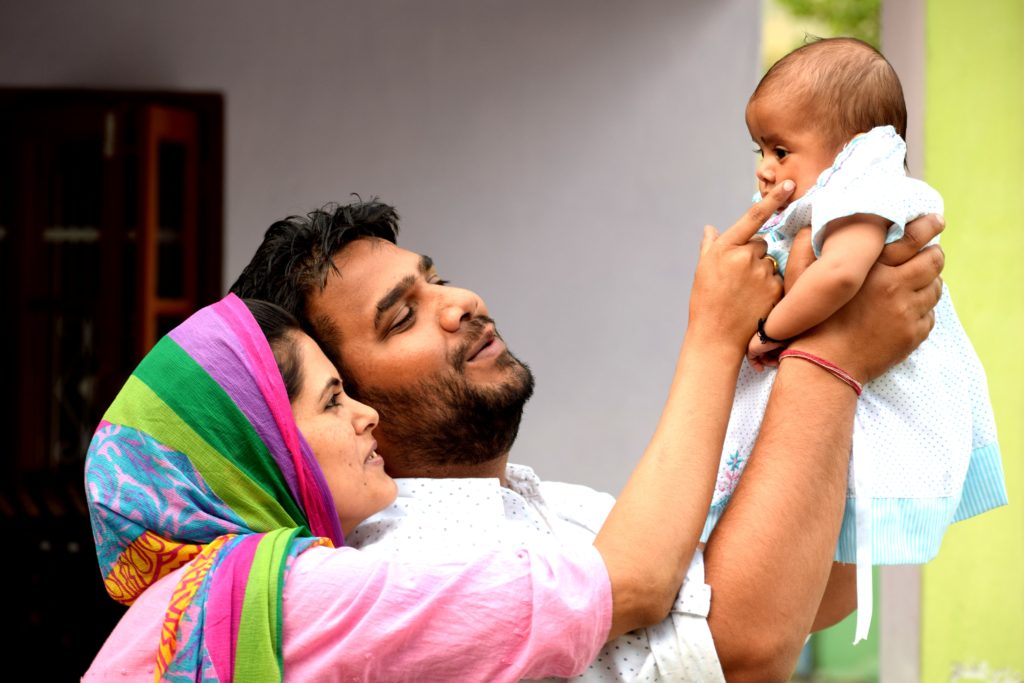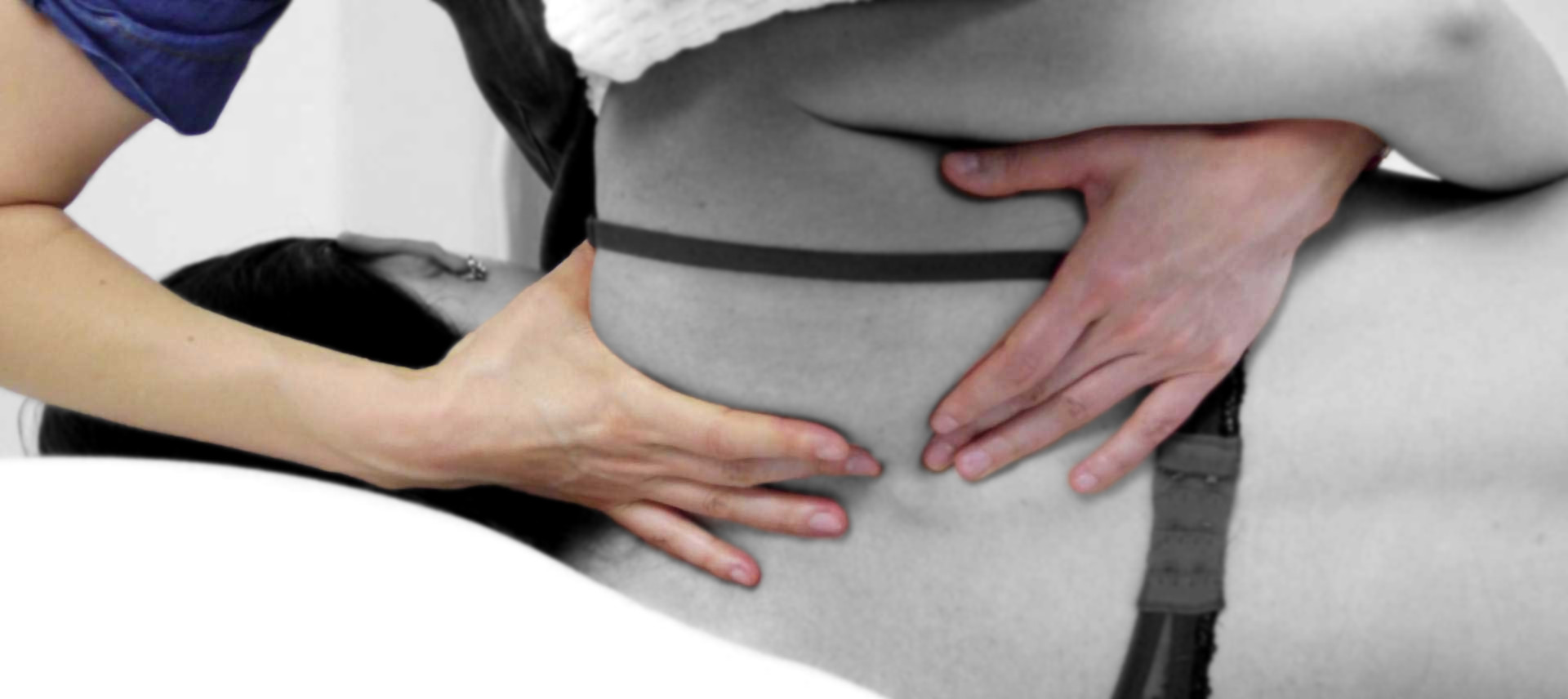Doula Laurel Tidman has been working as a birth doula for almost ten years. She accompanies women in hospitals, birthing centers, and at home. Here, she shares what her profession has taught her and how it is to be a mother, herself.
Anja: Laurel, you are working as a doula. Which memory do you like to recall?
Laurel: Over the past years I have built an enormous bank of beautiful, moving memories. Some are of families at the moment their baby is born – the joy, the love, and exhaustion create some unforgettable moments. I also have precious memories of deep, powerful eye contact with a birthing person as they surrender to their sensations of labour.
Doula support is individual birth care
Anja: How do you work with the women?
Laurel: I work with each of my clients differently. Doula support is individualised care. I first try to get to know the families I am working with to get a better understanding of the type of support they are looking for. Some people need lots of information. Others want lots of hands on labour support. Some want to know someone is present in their corner as an “insurance” in case their birth does not go normally or as expected. Others are looking for a guide or a team member to help them process and cope with the sensations of birthing. Other times, I am hired specifically to help the partner be the support the birthing person wants. Sometimes I am hired to help a person have a natural, unmedicated birth; and other times I am hired to help them ensure they get pain relief at the appropriate time for them.

“No one should feel like their birth was done to them”
Anja: There is often fear around the birth, especially for first-time-mothers. Do you think the fear is justified or is birth dramatized in movies and media?
Laurel: I always tell clients, a little bit of fear is healthy and normal, especially if this is a first experience. I mean, it is normal to be afraid of a rollercoaster the first time you ride one, why should you not be a bit afraid of birthing a baby? Now, how you use that fear is the question to think about. Birth is absolutely over dramatized in movies and on TV and it is rarely represented realistically. That is a great frustration for me. So many people believe that it is normal to labour to start dramatically with yelling and screaming and huge gushes of fluids – this is not the truth, this is entertainment.
Anja: What did your profession teach you that mothers should know?
Laurel: Parents need to know they have a voice. They need to know they always have choices. Sometimes, especially in a hospital environment, options might not be apparent but I promise you, they exist. No one should feel like their birth was done to them. You have the right to ask questions, understand what is being proposed as well as be informed on both risks and benefits of any intervention being suggested.
“I carry the strength I found in myself close to my heart to this day”
Anja: You are a mother of two. How did you experience your pregnancies and the deliveries? Did you have help by a doula or your mother?
I had neither my mother nor a doula with my for my births, I didn’t even know doulas existed when I had my first child. My husband was with me both times and bless him, he didn’t have a clue how to help me. To be fair, I didn’t have a clue what I needed either. My pregnancies were straight forward and my first induced labour was in a hospital and very quick. I wish I had had someone in the room with us to let us know how things were progressing, we had no idea and I was blindsided by how quickly and intensely the contractions were coming.
The fact of the matter is, partners know the birthing person intimately. Their insight is invaluable in supporting a labouring person. Doulas know the intricacies of birth.
Had a doula been with me, I am sure she could have calmed and reassured me that everything was going very well. Instead I panicked and requested an epidural that never really kicked in because soon after it was installed, I was pushing my baby out. My second birth, two years later, was very different. I had learned a lot and opted for a midwife attended birth at a Maison de Naissance. It was another fast labour but this time I understood what was going on and my midwife was able to guide my husband to help me this time around. I loved that birth and carry the strength I found in myself close to my heart to this day.
Welcome your child together
Anja: When you gave birth, was it already common that the partners were around? How did your husband experience the birth?
Yes, 17 years ago partners were absolutely expected to be in attendance at their baby’s birth. My husband very openly said that he preferred the role of “witness” over “coach.” Once we were on the same page, I appreciated the support he could offer and loved welcoming our babies into the world together.

Too many people tell you to “be thankful your baby is healthy” or, “at least you are both fine now” but that does not help families process their hurt and disappointment. I’ve found that listening with an open heart and without judgement is far more healing to a birthing family rather than encouraging them to stuff their emotions down.
Respect your partner’s wish to be part of the birth – or not
Anja: When talking about the fathers – or the partner – in the delivery room: what does your experience tell you – do you recommend it?
Laurel: I recommend it as long as the partner wants to be there. Every once in a while I meet a family in which the partner does not feel equipped to be in the labour room. Sometimes it is just a matter of correcting a few pieces of misinformation and then they feel better about being present. But sometimes, partners just knows it is not the right place for them and in those cases I think it is best their wishes be respected.
Anja: How can partners be helpful to their women during delivery?
Laurel: There are innumerable ways partners are helpful during labour as well as innumerable ways doulas can support them. The fact of the matter is, partners know the birthing person intimately. Their insight is invaluable in supporting a labouring person. Doulas know the intricacies of birth and so when we work together with partners, birthing people can receive a full complement of support.
At times, young families need an open ear
Anja: Do you recall a time when a delivery did not go as imagined, how did you support the woman?
Laurel: Unfortunately, not all births go as we wish. Yes, I have witnessed births that left parents feeling grief, fear and sometimes anger about their experience. The best way to support these emotions is to validate them. Too many people tell you to “be thankful your baby is healthy” or, “at least you are both fine now” but that does not help families process their hurt and disappointment. I’ve found that listening with an open heart and without judgement is far more healing to a birthing family rather than encouraging them to stuff their emotions down.
Breastfeeding came quite easily but it was confusing to me. “How could my baby need to eat so often? Was I doing something wrong?”

Sometimes a doula helps folding the laundry, too
Anja: How was it, the first time at home with your new-born. Did breast-feeding go all smooth right away? How did you manage your days? Did you have help?
Laurel: The first days with my newborns are a blur. I don’t remember the details at all. For the most part everything went smoothly. Breastfeeding came quite easily but it was confusing to me. “How could my baby need to eat so often? Was I doing something wrong?” Thankfully, the postpartum nurses and the CLSC nurse were very encouraging after my first baby’s birth and my midwife was equally helpful after my second baby’s birth. I did not have postpartum support per se from a doula or family members but I do remember feeling supported. I think my husband, my family, and my community stepped up both times but I could not tell you exactly how anymore.
Anja: How do you as doula help the women post-delivery?
Laurel: Postpartum care is again different for every client. There is often a lot of breastfeeding support. We discuss about sleep for the parents and the baby, share birth story, baby care questions, and so on. If I am providing postpartum doula care, I often wear the baby. So its parents can get a few hours of sleep while I putter around tidying or folding laundry.
Parenting is getting the groove and losing it
Anja: You have two children who are not babies anymore – among parents: is having a baby just the beginning of the joyful chaos or is there a time when you get the groove?
Laurel: Ha! I’ve gotten and lost my groove countless times in my parenting journey. If there is one thing I know for sure, it is that nothing stays the same. I have certainly gained confidence with time and built a solid community of mothers to hold me up when parenting feels hard or crazy. Raising children doesn’t happen in a vacuum. Choose your people and don’t be afraid to call them when you need help. Everything else is love.
Thank you for the interview.
https://www.doula-montreal.ca/
https://motherwit.ca/meet-the-doulas
Cell: 5140812-8147
Email: doulalaurel@gmail.com

